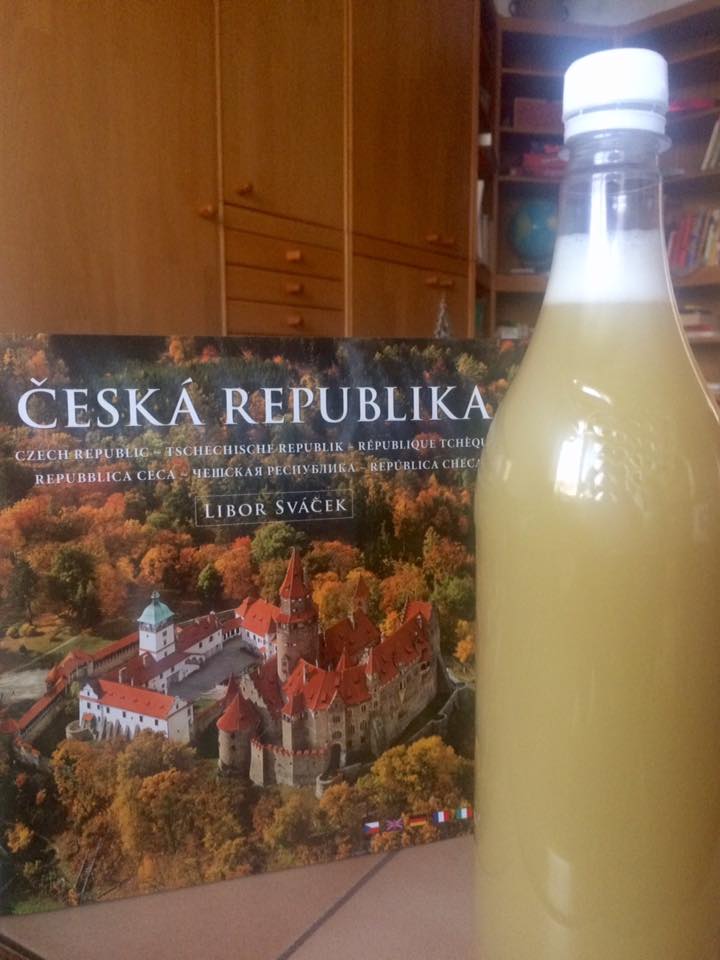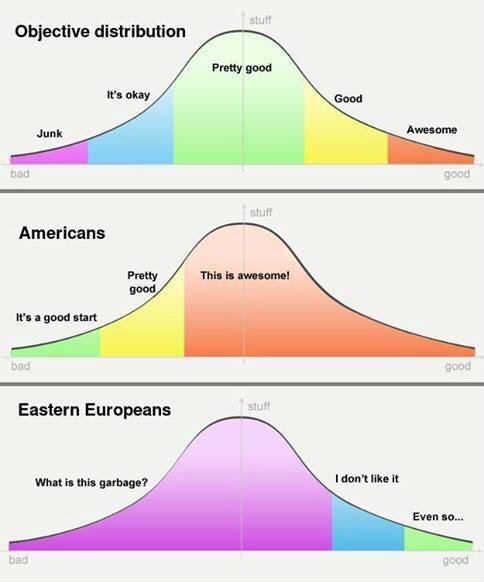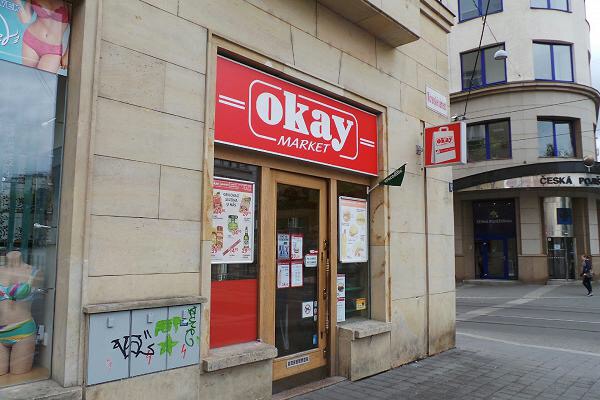As I have learned in the last few years, Central/East Europeans and Americans have completely different ways of expressing their enthusiasm.
Here’s a helpful chart!
It’s obviously exaggerating, but stereotypes can be true in a general sense. I’ve witnessed the “enthusiasm disparity” personally to some degree about Czechs, Germans, Poles, Slovaks, Hungarians, Croats and Ukrainians, and it’s of course more true for older people.
And many people can testify that one typical giveaway of Americans is their boundless enthusiasm. Sometimes I get so carried away with how “AMAAAAZING” or “AAAAWESOME” something is that even my boyfriend Ondra is like, ‘Dude, your enthusiasm is killing my chill Czech vibe.’
It’s also obvious that some words get trickily adopted by the language you are trying to learn. They are sometimes so sneaky you barely notice them. What I’m talking about right now is the Czech word oukej for our English okay. Sounds exactly the same, spelled suspiciously different!
But there’s something else up with the concept of OK in Czech.
When I found this chart, it made me think of a convenience-type store I have seen on walks in Brno called Okay Market.
Okay Market? Okay, well that’s… okay… the food must be okay, I guess?
Then I had the sneaking suspicion I had seen other stores in Brno and *around* that followed this trend. A quick Google search revealed at least four stores in the near vicinity that had “OK” or “Okay” in their name.
Huh, I thought, this must be some kind of trend.
I don’t know where it comes from, but honestly… this has got to come from a misunderstanding about what “okay” means. For Americans (and obviously I am extremely biased), saying something is “okay” means it’s fine, it’s middle of the road, it could be better but it will do. Even on the chart above, *objectively* “okay” is actually worse than the average of good and bad 😛
Let’s go back to the “enthusiasm disparity.” What is less-than-average to average for Americans is clearly better enough than average for Czechs to be acceptable advertising of quality in store names!
Here you can see the examples of an electrical goods store (left) and a toy store (right).
Am I overthinking this? I don’t want my coffee grinder or my phone cord or my board game or my fidget spinner to be just “OK,” I want it to be at least GREAT! 🙂
Clearly, Czech has changed not only the spelling of “okay” but also the meaning. It has redefined “okay” completely.
So guys, in terms of advertising… at least to the very specific group of American expats such as myself… you are doing it wrong. And I’m not sure you realize it. You are mis-advertising yourself! At least I can say this to be true in the case of my serendipitous Brno hairdresser, which is called:
I got an absolutely fabulous haircut there (<– American enthusiasm alert), and I could recommend it to anyone.
On another note…
***
Burčák season is upon us!
As the Foreigners.cz blog notes, burčák (young, fizzy wine) is a “sign of fall” in the Czech Republic. Find some tips for drinking it – for example, poking a hole in the bottle cap so it doesn’t explode as it gives off CO2 (this has happened to me) – over there.

How is it different from normal wine? Spoon University answers:
[T]he difference lies within the fact that burčák has to be closely monitored right from the start because within five to eight days, it enters the “burčák,” or active, stage of the fermentation process. Once it does this, the batch could be good for five days, ten days, even up to three weeks. However, if you drink it after it has exited this phase, it takes on a bitter, sour taste, and continues on its way to wine. The young wine, as it is often referred to, is stored in big vats.
Why should I drink it? Well, other than it’s sweet like juice yet still has alcohol in it, there are health benefits.
High vitamin B and lactic acid levels, along with the instant energy boost from the fruity drink, make it a very popular alcoholic option. Additionally, burčák can aid and speed up digestion.
Drinking too much or too fast, however, can have repercussions… trust any over-enthusiastic first-timer in CZ.
How much alcohol is in it?
[W]hen bought, the fermenting wine has usually 3-5% alcohol content. However, because it is still well in the fermentation process, it continues to grow in alcohol content even after you have finished your glass or bottle. It is not uncommon that the burčák rises to have an alcohol content of 10-12% inside of your body. This is where, if not consumed responsibly, the danger may lie (or the fun, the line can be pretty blurry).
Burčák season lasts til at least mid-October and sometimes into early November, so enjoy the opportunity for this awesome tradition while it lasts.






[…] As you can see, Americans START at “This is awesome!’ whereas the Czech default is “What is this garbage?” Or, as I covered in an earlier post, “This is okay I guess.” Everything is just okay! […]
LikeLike
[…] Oukej = okay. Czechification never ceases to amaze me. […]
LikeLike
[…] the way, if you feel like getting a haircut on your way to or from the Tower, you can try stopping by […]
LikeLike
[…] realized that there’s actually no one-to-one translation for this in Czech (probably because Czechs don’t get excited about anything 😉 ). I couldn’t believe it – the closest translation is a mild, […]
LikeLike
This was so interesting to read! It’s it funny how little things like this make such a big difference! It’s not the same, but kind of similar to how British people ask “Are you okay?” instead of the American “How are you?” It always threw me off because when we say “are you okay” it usually means you’re upset about something. So very funny that the Czech okay is like our awesome! That would get very confusing for me 😀
LikeLike
i didn’t know that about UK! yeah that would throw me off as well. in czech they’d either ask “how are you?” or “is everything okay (in order)?” one of my favorites is “are you normal?” (for ‘are you okay/crazy?’) 🙂
LikeLike
Hey Chloe, come drink burčák to Hustopeče u Brna!
One of the best burčák festivities in Moravia. First weekend in October.
LikeLike
thanks for the tip! 😀
LikeLike
That’s so interesting. Have you ever heard about the Swedish term “lagom”? It’s basically a term to describe something that’s just about right, not too bad and not too good. Scandinavians love things to be just about right for some reason…
LikeLike
the original Goldilocks Effect proponents, perhaps? 🙂
LikeLike
Hello,
I once read that OK was formed during a war when the soldiers returned and wrote the numbers of wounded and dead men on the tables. With no deaths, then it was zero killed => 0 K
LikeLike
Hello,
I once read that OK was formed during a war when the soldiers returned and wrote the numbers of wounded and dead men on the tables. At no death, it was zero killed => 0 K
LikeLike
hey Ivo, thanks- that’s really interesting! I wonder how it would have morphed into OK–>okay. any chance you could find a source that confirms the story, English or Czech?
LikeLike
This is actually a fascinating discussion that I’ve never quite looked at from the Czech side before. I’ve taught what “okay” means in American terms so many times but never really realized that the Czech OK is like our awesome. Way cool. And ohhhh, hooray for burcak season!
LikeLiked by 1 person
since you have both sides of it, do you agree with that chart? or is it an overexaggeration?
LikeLike
The Czechs seem to have had a fixation with “OK” for decades.
Aircraft on the Czech civil aviation register have “OK-” as the prefix on their registry codes. Several years ago, the old Czechoslovak Airlines used that in their official paint scheme from the mid 1970s to the early 1990s. In that period, their airliners had the words “OK Jet” painted large on their tails.
I guess if the airline felt their planes were “OK” enough to splash the fact all over their tails, it should have been good enough for the passengers to feel safe. 😀
LikeLike
oh – i have heard that – actually just recently, about the “OK” prefix! so you don’t think it’s a coincidence? there’re just too many examples…
LikeLiked by 1 person
“OK-” has been the civil aviation registration here since 1929, so that’s a lot of years for the country to be associated with the “OK” term both at home and abroad. I suspect it has something to do with the prevalence of “OK” companies in the country if only on a subconcious level.
LikeLiked by 1 person
huh. thanks Kevan!! still, it seems very unfortunate commercially. 😛
LikeLiked by 1 person
Unfortunate, but honest. The Czechs have a definite gift for understatement and I think “OK” reflects them well.
LikeLike
XD
LikeLike